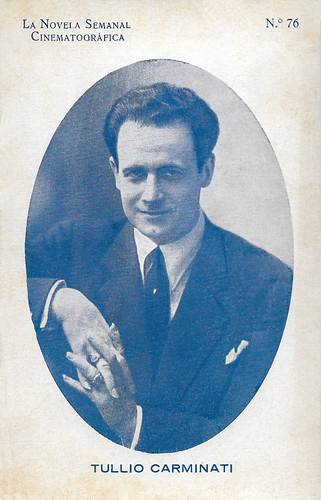
Spanish card by La Novela Semanal Cinematográfica, no. 76. Photo: A. Badodi, Milano.
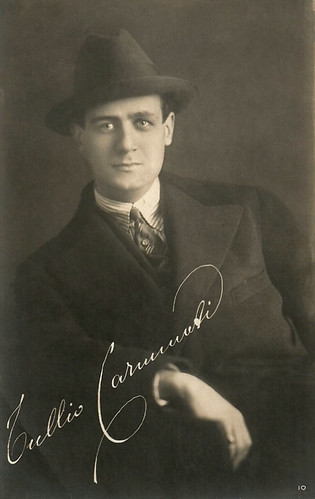
Italian postcard. Photo: Fotocolore, Torino.

Italian postcard by La Rotofotografica. Photo: Ambrosio Film. Tullio Carminati with the outfit and hairdo of Romanticismo (1915).
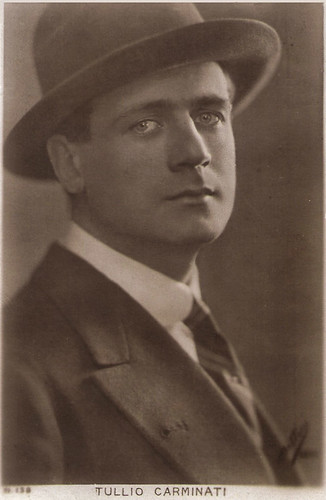
Italian postcard by Edizione Bettini, Roma, no. 128.

Italian postcard by Edizione Bettini, Roma, no. 199.
A modern, refined and sensible actor
Tullio Carminati was born as Count Tullio Carminati de Brambilla in Zara, Austrian-Hungarian Empire (now Zadar, Croatia) in 1892 (1894, according to IMDb and Wikipedia).
He ran away from school and joined a theatre company which soon ran into financial trouble. Disinherited and chased from the house by his father, he had to start working as an actor. He managed to get employed by Alfredo de Sanctis in 1907, during a Dalmatian tour by the latter. In 1909 Carminati arrived in Rome. By the mediation of actor Gustavo Serena, Carminati met Ferruccio Garavaglia, the first actor of the Compagnia Stabile Romana, which resided at the Teatro Argentina and which accepted him as an extra.
The company director, Ettore Paladini, was not convinced of Carminati’s talent and restricted him to modest parts. In 1910 actress Emma Gramatica discovered him while giving guest performances at the Argentina. She admired his elegance and spontaneity and convinced the management to give him Jeune premier parts.
Under this flag, star actor and director Ermete Novelli noticed him in 'La fiamma' and hired him in 1912 for his own company. Novelli became his teacher who taught him to give a balanced and natural performance and the taste for simple and touching solutions. Under the aegis of Novelli, Carminati transformed into a modern, refined and sensible actor, free of affectation.
Soon, Marco Praga hired Carminati for his Compagnia stabile of the Teatro Manzoni in Milan and let him play in various modern plays by Gabriele D’Annunzio, Dario Niccodemi, Praga himself, and others. During a tour in South America and back in Milan, the focus was more on the lighter repertory.

Italian postcard by IPA CT, no. 742. Photo: Ambrosio. Publicity still for Romanticismo (1915). Count Vitaliano Lamberti (Tullio Carminati) is arrested by the Austrians, while his mother (Mary Cléo Tarlarini) and his wife (Helena Makowska) cannot help. Caption: 'Lasciate almeno delle nostre donne la libertà di morire di dolore' (At least permit our women the liberty to die of sorrow!).
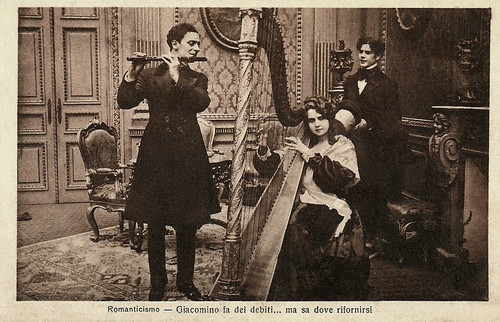
Italian postcard by IPA CT, no. 747. Photo: Ambrosio. Publicity still for Romanticismo (1915). Helena Makowska (Anna Lamberti), Tullio Carminati (Count Vitaliano Lamberti) and Domenico Serra (Giacomino) in Romanticismo (Carlo Campogaliani, 1915). The caption: 'Giacomino fa dei debiti..., ma sa dove refonirsi' (Giacomino makes debts... but knows where to find funds to repay them).
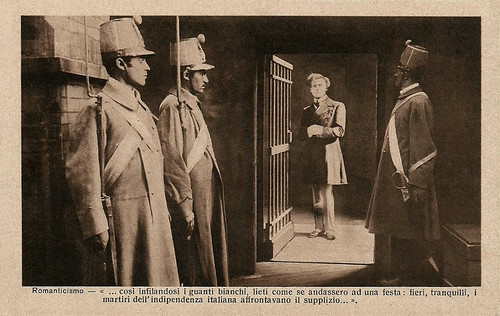
Italian postcard by IPA CT, no. 752. Photo: Ambrosio. Tullio Carminati in Romanticismo (1915).
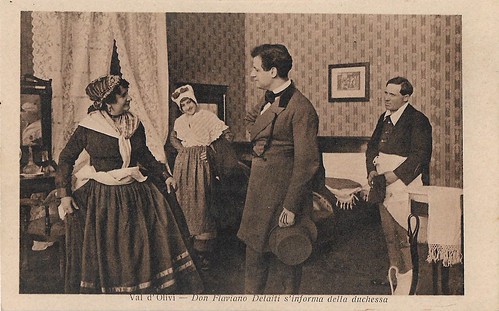
Italian postcard by IPA CT Duplex, no. 1704. Photo: Film Società Anonima Ambrosio Torino. V. Uff. Tullio Carminati in the Italian historical propaganda film Val d'Olivi (Eleuterio Rodolfi, 1916), based on the novel by Anton Giulio Barrili (1873). Caption: Don Flaviano Delaiti (Carminati) informs himself about the duchess.
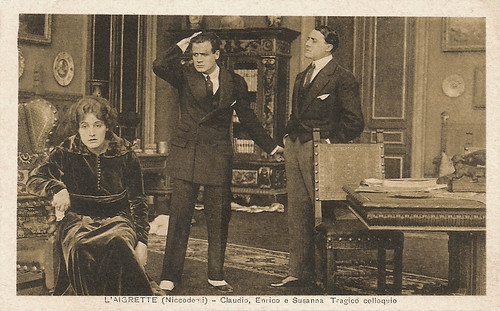
Italian postcard by IPA CT Duplex, no. 5108. Photo: Tiber Film. Hesperia, Tullio Carminati and André Habay in L'aigrette (Baldassarre Negroni, 1917). Caption: 'Claudio, Enrico e Susanna. Tragico colloquio' (Claudio, Enrico and Susanna. Tragic conversation). The countess of Saint-Servant (Ida Carolini Talli) has raised her son Enrico (Tullio Carminati) to be proud of his name and title, and to cherish honour and virtue, symbolised by the feather of her aigrette. In reality, the countess is hunted by creditors, and the castle is falling apart. Enrico falls in love with Susanne Leblanc (Hesperia), wife of a banker, and in return, she loads him with money in order to restore the castle. Her husband Claudio (André Habay) is not so happy with this kind of charity...
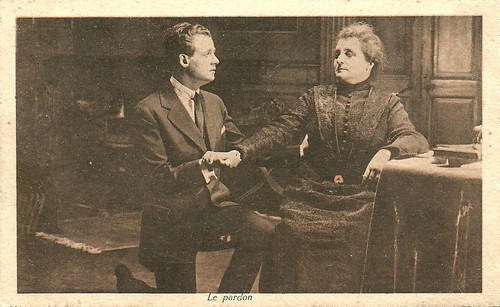
French postcard. Caption: 'Le pardon' (Forgiveness). Photo: Tullio Carminati and Ida Carloni-Talli in L'aigrette/The Egret (Baldassarre Negroni, 1917).
Eye for detail, realism and style
In 1914 Tullio Carminati made his début in the Italian silent cinema. His first film appearance was in La mia vita per la tua/My life for yours (1914), starring Maria Carmi and directed by Emilio Ghione. When the Manzoni company stopped in 1915, Carminati signed a contract with the Ambrosio company of Turin, playing in the propaganda film Romanticismo/Romanticism (Carlo Campogalliani, Arrigo Frusta, 1915), in which he was the Italian aristocrat fighting the Austrians during the Risorgimento.
His co-actress was Elena Makowska who had her breakthrough in this film. Carminati would be paired with Makowska in several other Ambrosio films, as in Val d’Olivi/Val of Olives (Eleuterio Rodolfi, 1915), again set at the Risorgimento. Carminati also did a few films with actress Madeleine Céliat, such as Davanti alla legge/In Front of the Law (Carlo Campogalliani, 1916). In 1916 Carminati joined the theatre company of Lyda Borelli and Ugo Piperno. He played in 'Nozze dei Centauri' (Wedding of the Centaurs), 'La donna nuda' (The Naked Woman) and 'Amanti'(Lovers). But soon Carminati left again and focused on film acting, with titles like Tramonto triste/Sad Tramonte (Giuseppe Pinto, 1916) and L’articolo IV/The article IV (Gennaro Righelli, 1917). At Tiber Film, he played in a series of films directed by Augusto Genina in 1916-1918: Kalidaa – la storia una mummia/Kalidaa - The History of a Mummy (1917), Il trono e la seggiola/The Throne and the Chair (1918) and in particular the successful films Il presagio/The Premonition (1916) and La menzogna/The Lie (1916), both with Vera Vergani.
By now Carminati had become a real film star, his face and shape endlessly reproduced on postcards, posters and photos, in particular his kiss from Il presagio. Between 1917 and 1922 Carminati acted in twelve star vehicles with the Italian diva Hesperia, such as L’aigrette/The Egret (1917), La donna dei cuori/The Woman of the Hearts (1917) and La donna abbandonata/The Abandoned Woman (1917), all directed by her husband Baldassarre Negroni. In the late 1910s, Carminati also played with Maria Jacobini in La via più lunga/The Longest Street (Mario Caserini, 1918) and he made a few films with Gemma and Bianca Stagno Bellincioni. In 1919 Carminati founded his own film company, Carminati-Film. He produced five films with it in 1919-1920, all directed by Enrico Roma, but in the end, he was forced to dissolve the company. All in all, Carminati played in some 37 Italian silent films between 1914 and 1924.
After some failures in the cinema, Carminati was forced to return to the stage. There he became extremely successful with his own company, together with Alda Borelli, Lyda's sister, in 1920 and 1921. Carminati’s plays were known for their eye for detail, realism and style and their lack of frivolous overdoing. He played elegant and refined characters, full of spirit and wit. However, his part as Armand in Alexandre Dumas fils' 'La dame aux camélias' (Camille) was considered as too cold.
When Borelli left the company in 1921, Carminati became the director and first actor of Eleonora Duse’s company. Here he directed three dramas of which he played only in one, 'Cosí sia' (Such is) by T. Gallarati Scotti. United Artists producer Joseph Schenck spotted him and offered him to come to Hollywood to play in a series of films, but after the failure of Carminati-Film and because of his workload at the theatre, Carminati had his doubts. When Duse went on tour to the US, Carminati joined the theatre company of Lucio d’Ambra and Mario Fumagalli, appearing in plays by Luigi Pirandello, Roberto Bracco and Sem Benelli. Carminati did only a few films in those years including Mensch gegen Mensch/Person against Person (Hans Steinhoff, 1923), shot in Germany with Alfred Abel in the lead. Between 1924 and 1925 Carminati did a series of plays with Italia Almirante Manzini and Lina Tricerri, including the very successful comedy 'Le nozze di Leporello' (The Wedding of Leporello) by Luigi Almirante.
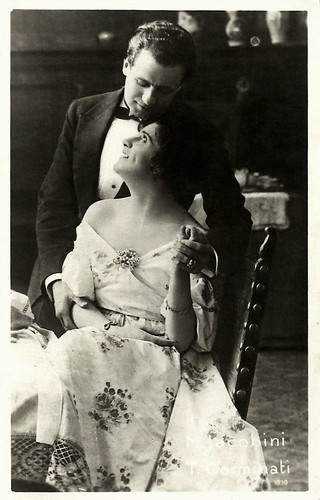
Italian postcard by Ed. Vettori, Bologna. Photo: probably publicity still for L'articolo IV (Gennaro Righelli, 1918) with Maria Jacobini and Tullio Carminati.
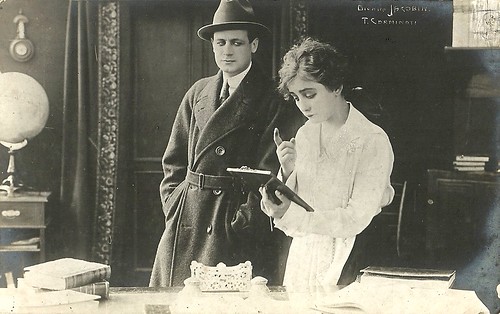
Italian postcard. After they acted together in L'aigrette (1917), Diomira Jacobini and Tullio Carminati acted together a few times at Tiber Film, but with Jacobini always in supporting parts, e.g. in La via della luce (1917) and La via più lunga (1918).
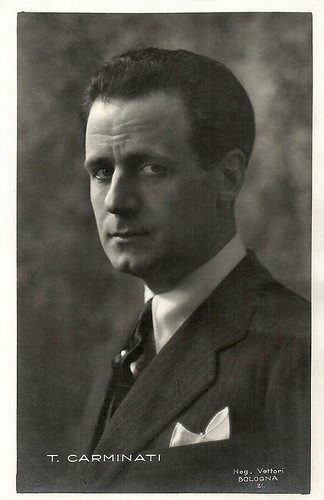
Italian postcard by Vettori, Bologna, no. 21.

Italian postcard, no. 74. Sent by mail in 1924. At the company Tiber Film, Carminati acted in a series of films directed by Augusto Genina in 1916-1918, in particular the successful films Il presagio (1916) and La menzogna (1916), both with Vera Vergani.

Italian postcard, no. 86. Photo: Tullio Carminati and Vera Vergani in Il presagio/The Premonition (Augusto Genina, 1916).

Spanish collectors card by Chocolat Imperial, no. 2 in a series of 6 'cromos. Photo: Verdaguer / FAI. Giovanni Schettini, Hesperia and Tullio Carminati in El Vertigo, Spanish title for the Italian silent drama Vertigine (Baldassarre Negroni, 1919).
Elegance, openness and sobriety
Fed up with the decline of the Italian film world and deluded by the collaboration with Italia Almirante Manzini and Lina Tricerri, Tullio Carminati went to the US in 1925, without any clear prospects and without speaking the language properly. After some time, he managed to get a contract with United Artists and played a detective in his first American film: The Bat (Roland West, 1926), with Jack Pickford and Louise Fazenda. This was followed by parts as the 'lover' in The Duchess of Buffalo (Sydney Franklin, 1926) with Constance Talmadge, and Stage Madness (Victor Schertzinger, 1927) with Virginia Valli. He then switched to Paramount where he reached fame with his part in Honeymoon Hate (Luther Reed, 1927) with Florence Vidor. He also acted in the Pola Negri vehicle Three Sinners (Rowland V. Lee, 1928).
With the advent of sound cinema, Carminati moved to New York and joined the company of Basil Rathbone. Critics liked his elegance, openness and sobriety, while audiences loved his foreign accent and Latin lover image. His American stage career was confirmed with Strictly Dishonorable by Preston Sturges, which ran for two years 1930-1931 in some 725 shows. The continuous success of this play reopened the doors of Hollywood for Carminati. Until 1940, he continued to play in various films, like Gallant Lady (Gregory LaCava, 1933), Moulin Rouge (Sydney Lanfield, 1934) with Constance Bennett, and One Night of Love (Victor Schertzinger, 1934) with Grace Moore.
In Europe, he played the male lead in the Franco-Italian production Marcia nuziale/The Wedding March (Mario Bonnard, 1935), starring Kiki Palmer. After another Broadway show, he acted in the romantic comedies Let’s Live Tonight (Victor Schertzinger, 1934) with Lilian Harvey, and Paris in Spring (Lewis Milestone, 1935) with Mary Ellis, establishing him as the mature Don Giovanni. In 1936 he acted in two British films by Herbert Wilcox: London Melody (1936) and The Three Maxims (1936), both starring Anna Neagle. In 1938, after a stay in Italy, he played again on Broadway in By Candle Light, and in 1939 in the comedy Stephen Jumel. In 1940 he played in Hollywood in Sunset in Vienna (Norman Walker, 1940), with Lilli Palmer, and in Safari (Edward H. Griffith, 1940), with Douglas Fairbanks Jr. and Madeleine Carroll.
In December 1941, a few days after the US declared war on Italy, Carminati was imprisoned. He was sent back to Italy in May 1942, because of anti-American activities. In the following year, he made his Italian cinema come-back in La via torna/The Street Turns (Pier Luigi Faraldo, 1943) and he joined the company of Elsa de Giorgi and Elena Zareschi, performing in various plays before and after the liberation there. In 1946 he joined the company Morelli-Stoppa, for which he played in 'Antigone' (Jean Anouilh), directed by Luchino Visconti. In 1953, after a stage absence of several years, Carminati returned to such plays as 'Il Ferro' (The Iron) by Gabriele D’Annunzio.
From the late 1940s until 1963, Carminati acted in various films in Italy, Spain, France and the US. Memorable titles are La Chartreuse de Parme/The Charterhouse of Parme (Christian Jaque, 1948) starring Gérard Philipe, La madonnina d’oro/The Golden Madonna (Ladislao Vajda, 1949) with Phyllis Calvert, La Beauté du diable/Beauty and the Devil (René Clair, 1950), the box office hit Roman Holiday (William Wyler, 1953) with Audrey Hepburn, Giovanna d’Arco al rogo/Joan of Arc at the Stake (Roberto Rossellini, 1954) with Ingrid Bergman, War and Peace (King Vidor, 1956), the epic El Cid (Anthony Mann, 1961) featuring Charlton Heston. His final film was The Cardinal (Otto Preminger, 1963). Tullio Carminati died in 1971 in Rome because of a brain haemorrhage. He was 78.
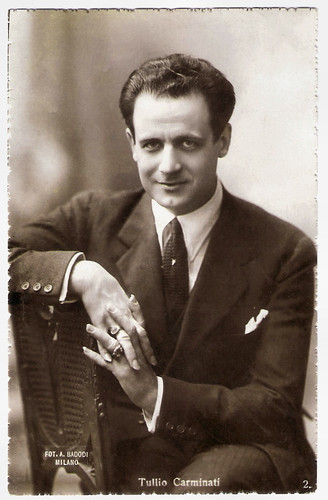
Italian postcard by Edizioni A. Traldi, Milano, no. 2. Photo: A. Badodi, Milano.

Italian postcard by Vettori, Bologna, no. 21.
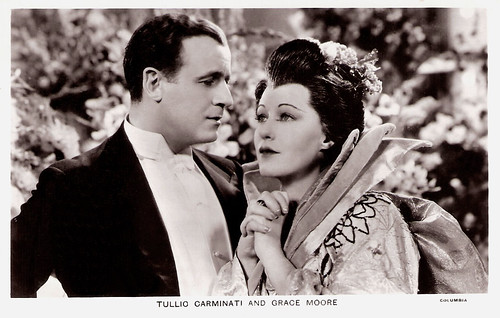
British postcard in the Film Partners Series, London, no. P 151. Photo: Columbia. Publicity still for One Night of Love (Victor Schertzinger, 1934) with Grace Moore.
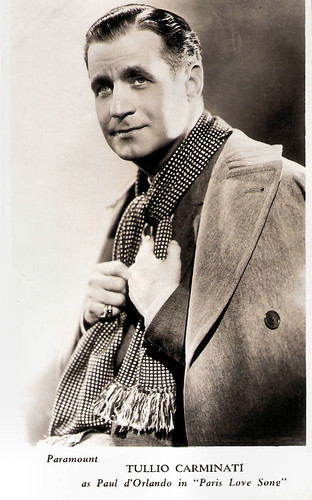
British postcard. Photo: Paramount. Publicity still for Paris in Spring/Paris Love Song (Lewis Milestone, 1935).

Italian postcard. Photo: Aser, Roma. Publicity still for La vita torna (Pier Luigi Faraldo, 1943) in which Carminati had the male lead.
Sources: Roberta Ascarelli (Italian - Treccani), Vittorio Martinelli (Italian - Il cinema muto italiano), Wikipedia (Italian and English), and IMDb.
This post was last updated on 2 September 2023.
No comments:
Post a Comment